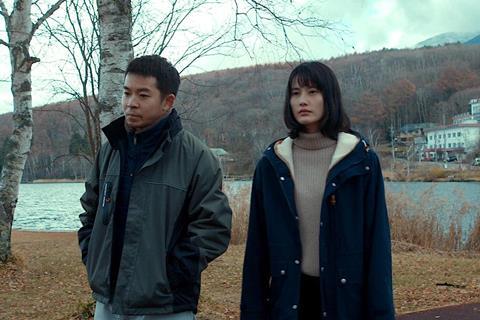A young Japanese couple approach love from very different angles in Akira Yamamoto’s vacant drama

Dir: Akira Yamamoto. Japan. 2023. 127mins
A Japanese film about love with something of a French touch, Akira Yamamoto’s third feature struggles to extract a meaningful story from a rather airless mise en scene, despite a directorial eye, and script, that are not short on visual and narrative ideas. Indulgently long, After the Fever begins well but soon drifts into a slow waltz of amorous angst and frustration that all but the most patient audiences will find it difficult to respond to.
It is curious just how little human contact is on display here
Premiering in Busan’s New Currents section, After the Fever may score further festival play thanks in particular to certain echoes of the shape-shifting, time-blurring romances of Hong Sangsoo or the slow, gentle descent into emotional complexity of Ryusuke Hamaguchi’s Drive My Car (whose production credits it largely shares). Yet, outside of a handful of moments, it lacks Hong’s lightness of touch or Hamaguchi’s gift for making a little add up to a lot.
Known until recently mostly for her work in commercial youth romances and horror yarns, Ai Hashimoto plays Sanae, a young woman reduced to a state of near emotional catatonia after a love affair which ended in violence and jail time. Despite commenting on her “lifeless eyes” on a Tokyo date brokered and attended by Sanae’s mother, easy-going forestry worker Kenta (prolific actor Taiga Nakano) is keen enough to persist – and, after the deferred opening credits, we suddenly find them married and living in the countryside near the shores of Lake Suwa. But Sanae’s eyes are as dead as ever. While waiting for her to thaw, Kenta meets Yoshiko (Mai Kiryu), the wife of Sanae’s former lover, whose call out to Kenta for tree clearance in her garden is revealed to be less than accidental.
Shot in a flat, wintry light and scored by the gentle reverb chords of Tajuro Okada’s minimalist soundtrack, which at times seems to be channeling Jan Gabarek, After the Fever deploys its arguments about love in a series of static, wordy tableaux punctuated by long silences. Some involve Sanae and her kindly old analyst in Tokyo, while in others, her amour fou argument – that true love must be all-consuming and can end only in a death pact – clashes with Kenta’s patient conviction that his wife can be saved by a milder form of constant care and affection, or Yoshiko’s more grown-up, jaded view that life is by definition an emotional mess.
These fragments of an amorous discourse are reflected and refracted in the film’s off-season lakeside setting, with its swan pedalos all ready for courting couples; in Kenta’s tree-clearing work, which involves eliminating both dead wood and perfectly healthy trees; and in Yoshiko’s passion for hunting with an antique gun and laying snares in the forest.
It is curious just how little human contact is on display here. There’s no sex, one episode of awkward hand holding, two hugs, and one surprise kiss. Perhaps this is the ironic point of a film set in a strange Generation Z world of emotionally locked-down 20-somethings who spend a lot of time talking about the things they are not actually doing. But with its almost unwavering mood of chilled anomie and central character who sucks all the life out of the room like a J-horror heroine, it is difficult to decide whether this is a deeply sincere, lugubrious modern melodrama or a bleak, undeclared satire.
This is not to say that there’s aren’t a few glimmers of promise buried in the mix (for one, in a lovely sequence involving Yoshiko and a rowing boat). After the Fever is the kind of frustrating curio that nevertheless makes you want to bookmark the director for future reference.
Production companies: Nekojarashi, Bitters End, Hitsukisha
International sales: Bitters End, sadai@bitters.co.jp
Producer: Teruhisa Yamamoto
Screenplay: Lee Nawon
Production design: Keiko Matsunaga
Editing: Keiko Okawa
Cinematography: Yasutaka Watanabe
Music: Takuro Okada
Cast: Ai Hashimoto, Taiga Nakano, Mai Kiryu
























